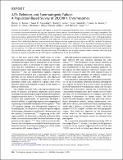| dc.contributor.author | Rozen, Steven G. | |
| dc.contributor.author | Marszalek, Janet D. | |
| dc.contributor.author | Irenze, Kathryn | |
| dc.contributor.author | Skaletsky, Helen | |
| dc.contributor.author | Brown, Laura G. | |
| dc.contributor.author | Oates, Robert D. | |
| dc.contributor.author | Silber, Sherman J. | |
| dc.contributor.author | Ardlie, Kristin | |
| dc.contributor.author | Page, David C | |
| dc.date.accessioned | 2014-11-12T13:35:10Z | |
| dc.date.available | 2014-11-12T13:35:10Z | |
| dc.date.issued | 2012-10 | |
| dc.date.submitted | 2012-08 | |
| dc.identifier.issn | 00029297 | |
| dc.identifier.issn | 1537-6605 | |
| dc.identifier.uri | http://hdl.handle.net/1721.1/91523 | |
| dc.description.abstract | Deletions involving the Y chromosome’s AZFc region are the most common known genetic cause of severe spermatogenic failure (SSF). Six recurrent interstitial deletions affecting the region have been reported, but their population genetics are largely unexplored. We assessed the deletions’ prevalence in 20,884 men in five populations and found four of the six deletions (presented here in descending order of prevalence): gr/gr, b2/b3, b1/b3, and b2/b4. One of every 27 men carried one of these four deletions. The 1.6 Mb gr/gr deletion, found in one of every 41 men, almost doubles the risk of SSF and accounts for ~2% of SSF, although <2% of men with the deletion are affected. The 1.8 Mb b2/b3 deletion, found in one of every 90 men, does not appear to be a risk factor for SSF. The 1.6 Mb b1/b3 deletion, found in one of every 994 men, appears to increase the risk of SSF by a factor of 2.5, although <2% of men with the deletion are affected, and it accounts for only 0.15% of SSF. The 3.5 Mb b2/b4 deletion, found in one of every 2,320 men, increases the risk of SSF 145 times and accounts for ~6% of SSF; the observed prevalence should approximate the rate at which the deletion arises anew in each generation. We conclude that a single rare variant of major effect (the b2/b4 deletion) and a single common variant of modest effect (the gr/gr deletion) are largely responsible for the AZFc region’s contribution to SSF in the population. | en_US |
| dc.description.sponsorship | National Institutes of Health (U.S.) | en_US |
| dc.description.sponsorship | Howard Hughes Medical Institute | en_US |
| dc.description.sponsorship | Singapore. Agency for Science, Technology and Research | en_US |
| dc.description.sponsorship | Singapore. Ministry of Health | en_US |
| dc.language.iso | en_US | |
| dc.publisher | Elsevier | en_US |
| dc.relation.isversionof | http://dx.doi.org/10.1016/j.ajhg.2012.09.003 | en_US |
| dc.rights | Article is made available in accordance with the publisher's policy and may be subject to US copyright law. Please refer to the publisher's site for terms of use. | en_US |
| dc.source | Elsevier | en_US |
| dc.title | AZFc Deletions and Spermatogenic Failure: A Population-Based Survey of 20,000 Y Chromosomes | en_US |
| dc.type | Article | en_US |
| dc.identifier.citation | Rozen, Steven G., Janet D. Marszalek, Kathryn Irenze, Helen Skaletsky, Laura G. Brown, Robert D. Oates, Sherman J. Silber, Kristin Ardlie, and David C. Page. “AZFc Deletions and Spermatogenic Failure: A Population-Based Survey of 20,000 Y Chromosomes.” The American Journal of Human Genetics 91, no. 5 (November 2012): 890–896. © 2012 The American Society of Human Genetics | en_US |
| dc.contributor.department | Massachusetts Institute of Technology. Department of Biology | en_US |
| dc.contributor.department | Whitehead Institute for Biomedical Research | en_US |
| dc.contributor.mitauthor | Page, David C. | en_US |
| dc.relation.journal | The American Journal of Human Genetics | en_US |
| dc.eprint.version | Final published version | en_US |
| dc.type.uri | http://purl.org/eprint/type/JournalArticle | en_US |
| eprint.status | http://purl.org/eprint/status/PeerReviewed | en_US |
| dspace.orderedauthors | Rozen, Steven G.; Marszalek, Janet D.; Irenze, Kathryn; Skaletsky, Helen; Brown, Laura G.; Oates, Robert D.; Silber, Sherman J.; Ardlie, Kristin; Page, David C. | en_US |
| dc.identifier.orcid | https://orcid.org/0000-0001-9920-3411 | |
| mit.license | PUBLISHER_POLICY | en_US |
| mit.metadata.status | Complete | |
